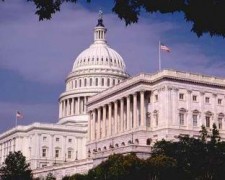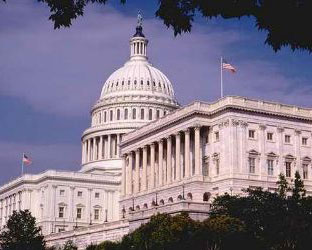 House Communications Subcommittee Greg Walden (R-OR) still thinks that the processes at the FCC need to be reformed, while Ranking Member Anna Eshoo (D-CA) thinks the effort to reform the FCC can be more accurately described as an effort to hamstring it. All we know is that we heard all of this last year.
House Communications Subcommittee Greg Walden (R-OR) still thinks that the processes at the FCC need to be reformed, while Ranking Member Anna Eshoo (D-CA) thinks the effort to reform the FCC can be more accurately described as an effort to hamstring it. All we know is that we heard all of this last year.
NAB President/CEO Gordon Smith complimented Walden on his effort, stating, “”NAB continues to support efforts by Chairmen Upton and Walden to take a fresh look at FCC processes to ensure that Commission procedures don’t impede the ability to serve the public interest. The agency has a critically important mission, and it is imperative that it execute that mission expeditiously, fairly and in a data-driven manner. We look forward to working with the Committee and the Commission to ensure that the FCC functions at the highest level for the American people.”
Walden’s statement
Walden reiterated his support for the bills. His argument:
The communications industry is one of the few sectors still firing on all cylinders in this economy averaging $80 billion a year in investment since 1996. It cannot continue to do so, however, if faced with poor FCC process. As Blair Levin, a previous FCC chief of staff and architect of the National Broadband Plan, has lamented, “[t]he FCC is becoming more of a political institution and less an expert agency.”
Former Chairman Genachowski did make progress in reforming the Commission but there is more to do. The agency has fallen short in the past under both Democrat and Republican administrations. Without codification of certain protections, it will undoubtedly do so again. Only statute can ensure good process from commission to commission. That is why we are discussing two draft bills today designed to minimize the potential for procedural failings, curb abuse, and improve agency decision making.
The FCC Process Reform Act passed the House as H.R. 3309 last Congress on a 247-174 bipartisan vote. Contrary to the assertions of some, it does not change the “public interest test” or strip the FCC’s authority to protect consumers and competition. It merely asks the agency to do what we ask of most grade-school students—to show its work. To publish the specific language of proposed rules, identify a market failure or actual consumer harm, and conduct a cost-benefit analysis before regulating. To give commissioners, parties, and the public an adequate opportunity to review proposed rules. To publish the text of decisions promptly and examine whether adopted rules are meeting their purpose. To set “shot clocks” to “give the parties and the public more confidence that the agency is acting with dispatch,” as Commissioner Pai put it in his recent statement on the Softbank-Sprint-Clearwire transaction. Many of these ideas can be found in President Obama’s 2011 Executive Order on “Improving Regulation and Regulatory Review,” which binds executive branch agencies but, unfortunately, not to the FCC.
The draft bill also requires any transaction conditions to be narrowly tailored to transaction specific harms and otherwise within the FCC’s jurisdiction. This was in the bill before Mr. Wheeler was nominated for FCC Chairman, but his blog about the AT&T-T-Mobile merger reinforces the need. In it he notes that the Communications Act does not currently prohibit the FCC from “imposing merger terms and spectrum auction rules that might seem to be regulation in another guise.” This is precisely what the transaction review process should not be used for—back-door rulemaking. Despite what you may hear, the bill does not dictate the outcome of a transaction review or alter the public-interest standard. The FCC can still find a proposed merger to be against the public interest and deny the transaction or adopt tailored conditions to remedy specific concerns.
Some opponents argue implementing this bill would be difficult and will lead to litigation. But it’s also not true. Most of the provisions rely on established definitions and accepted concepts under the Communications Act, the APA, and other law. And rather than micromanage the agency the bill largely establishes principles and gives the FCC flexibility on how to implement them. I’d nonetheless be happy to work with anyone who has a “good faith” interest in improving language.
Others say it would be unwise to apply these types of reforms except government wide in the context of the Administrative Procedure Act. That would be fine with me. But this committee does not have jurisdiction over the APA and we need to start somewhere. Since the FCC oversees a huge and growing part of the economy, it seems a worthy candidate to commence the discussion.
The second draft bill, the FCC Consolidated Reporting Act, passed the House as H.R. 3310 last Congress by voice vote. The legislation looks to relieve burdens on the agency and make its reports more meaningful. It does so by consolidating eight statutorily mandate reports into one biennial report and eliminating 12 outdated studies, like one on the telegraph industry. The existing reports are cumbersome and often unnecessary. A recent GAO study on the video competition report, for example, concluded that the reports may not be needed on an annual basis, “especially given demand on FCC staff’s time for other monitoring and regulatory duties.” The proposed consolidated report will help break down siloed thinking and present a more useful picture of the marketplace upon which to base policy judgments.
The last thing that we want to do is stifle an industry that is continually growing and innovating. Yet that is exactly what could happen if the FCC is not held to certain standards of decision-making. The industry deserves an efficient and effective regulator we can truly call “expert,” just as the public deserves a transparent and accountable federal government. These reforms are a good place to start.
Eshoo’s statement
Here is what Eshoo’s had to say generally opposing the bills:
Just two weeks ago, Mr. Chairman, we had bipartisan consensus on the need to focus on how federal agencies use spectrum. Today, we return to legislation that this Subcommittee has debated for three straight years. It hasn’t nor will it go anywhere. Administrative Law experts tell us it would tie the Federal Communications Commission (FCC) up in years of litigation. Simply put, the bill contains bad policy.
This proposed “FCC process reform” is a backdoor way of gutting the FCC’s authority. Congress created the FCC to safeguard the public interest. Big corporations are well-equipped to advance their private interests, but consumers need advocates. And competitors and innovators need a referee to level the playing field.
As we all know, the FCC faces an enormous set of challenges in the coming years, including the upcoming voluntary incentive spectrum auction, the transition to IP, and the modernization of the E-Rate program in our nation’s schools and libraries. Our role at the Subcommittee should be to ensure the agency is equipped with the tools to meet these challenges, while ensuring the FCC can continue to protect the public interest and preserve competition in the communications marketplace.
If we really want to accomplish meaningful reform, let’s start with a proposal that enjoys nearly universal support, including that of Acting FCC Chairwoman Clyburn, FCC Commissioners Pai and Rosenworcel and Former FCC Commissioners Abernathy, Copps and McDowell. The FCC Collaboration Act of 2013 (H.R. 539) is bipartisan, bicameral legislation that will allow FCC Commissioners to more easily collaborate with one another outside of public meetings. As the FCC increasingly responds to complex, highly technical issues, now is the time to get this legislation passed and signed into law.
Second, I support allowing Commissioners to appoint an electrical engineer or computer scientist to their staff, a bipartisan proposal offered last Congress by former Rep. Stearns. Third, I support the creation of an online searchable database of consumer complaints, an idea advanced by Ranking Member Waxman in the previous Congress. Finally, I agree that there could be opportunities to streamline many of the reporting requirements Congress has placed on the FCC.
Mr. Chairman, we’re now in the seventh month of the 113th Congress, but only one bill has moved through our Subcommittee. Instead of working on legislation that creates billable hours for Washington telecom lawyers, let’s work together to craft policies that will create jobs for innovators, promote investment in infrastructure across the country, and technological advances that help American families.
I thank each of our witnesses for their testimony today, and for working with our Subcommittee to drive competition, promote innovation and protect consumers.
RBR-TVBR observation: Eshoo is right about at least one thing. Last year this bill passed the House and the Senate didn’t so much as acknowledge it, much less hold a hearing. And we can expect the same thing again this year.





